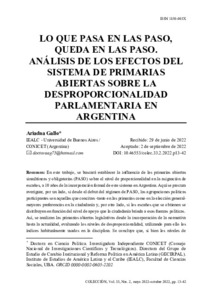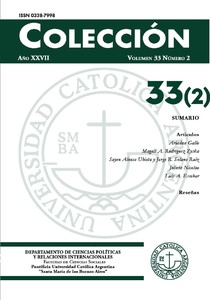Por favor, use este identificador para citar o enlazar este ítem:
https://repositorio.uca.edu.ar/handle/123456789/16180| Título: | Lo que pasa en las PASO, queda en las PASO : análisis de los efectos del sistema de primarias abiertas sobre la desproporcionalidad parlamentaria en Argentina What happens in las PASO, stays in las PASO : analysis of the effects of the open primary system on parliamentary disproportionality in Argentina |
Autor: | Gallo, Ariadna | Palabras clave: | ELECCIONES; SISTEMAS ELECTORALES; PARTIDOS POLITICOS | Fecha de publicación: | 2022 | Editorial: | Pontificia Universidad Católica Argentina. Facultad de Ciencias Sociales. Departamento de Ciencias Políticas y Relaciones Internacionales | Cita: | Gallo, A. Lo que pasa en las PASO, queda en las PASO : análisis de los efectos del sistema de primarias abiertas sobre la desproporcionalidad parlamentaria en Argentina [en línea]. Colección. 2022, 33 (2). doi: 10.46553/colec.33.2.2022.p13-42. Disponible en: https://repositorio.uca.edu.ar/handle/123456789/16180 | Resumen: | Resumen: este trabajo, se buscará establecer la influencia de las primarias abiertas
simultáneas y obligatorias (PASO) sobre el nivel de proporcionalidad en la asignación de
escaños, a 10 años de la incorporación formal de este sistema en Argentina. Aquí se procura
averiguar, por un lado, si desde el debut del régimen de PASO, las agrupaciones políticas
participantes son aquellas que concitan -tanto en las primarias como en la elección generalmayores
preferencias en la ciudadanía y, por otro lado, si los escaños que se obtienen se
distribuyen en función del nivel de apoyo que la ciudadanía brinda a esas fuerzas políticas.
Así, se analizan las primarias abiertas legislativas desde la incorporación de la normativa
hasta la actualidad, evaluando los niveles de desproporcionalidad, utilizando para ello los
índices habitualmente usados en la disciplina. Se concluye que, si bien los niveles de desproporcionalidad en las elecciones generales han disminuido, si se evalúa al sistema en su conjunto, no ha habido un incremento en el grado de representatividad resultante. Abstract: In this work, we will seek to establish the influence of open simultaneous and mandatory primaries (PASO) on the proportionality in the allocation of seats, 10 years after the formal incorporation of this system in Argentina. Here we will try to find out, on the one hand, if since the debut of the PASO regime, the participating political parties are those that attract - both in the primaries and in the general election - greater preferences in the citizenship and, on the other hand, if the obtained seats are accordingly distributed according to the level of support that these political forces receive from citizens. Thus, we have analyzed the open legislative primaries from the incorporation of the regulations to the present, evaluating the levels of disproportionality, using the indices usually used in the field. We have concluded that, although disproportionality in the general elections has decreased, if the system as a whole is evaluated, there has been no increase in the resulting degree of representativeness. |
Cobertura Espacial: | Argentina | URI: | https://repositorio.uca.edu.ar/handle/123456789/16180 | ISSN: | 1850-003X (en línea) 0328-7998 (impreso) |
Disciplina: | CIENCIA POLITICA | DOI: | 10.46553/colec.33.2.2022.p13-42 | Derechos: | Acceso abierto | Fuente: | Colección. 2022, 33 (2) |
| Aparece en las colecciones: | COL - 2022 Año XXVII nro. 33-2 |
Ficheros en este ítem:
| Fichero | Descripción | Tamaño | Formato | |
|---|---|---|---|---|
| pasa-paso-queda-paso.pdf | 429,11 kB | Adobe PDF |  Visualizar/Abrir | |
| cover_issue_442_es_AR.jpg | 265,96 kB | JPEG |  Visualizar/Abrir |
Visualizaciones de página(s)
59
comprobado en 27-abr-2024
Descarga(s)
105
comprobado en 27-abr-2024
Google ScholarTM
Ver en Google Scholar
Altmetric
Altmetric
Este ítem está sujeto a una Licencia Creative Commons

